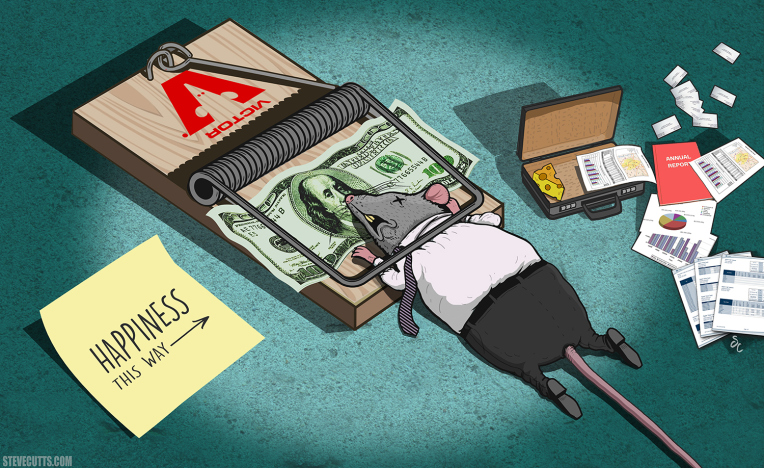By Maria Koulourioti,
Undoubtedly, human beings are consumptive organisms. We cannot function without consuming. Everybody buys in the context of modern society and not in Dafoe’s Crusoe. Being our entire economic system, it does not matter what we buy, we just buy, and on various occasions, the art of overconsumption has developed into a ritualistic behavior. Nowadays, that we have overcome by far the pretext of basic needs, and individual demands are getting even more complex, we are alienated from creating while we focus on producing. We have replaced connecting with obligatory socializing, and on the verge of the iceberg, we observe the substitution of emotional needs with the plasmatic value of material possessions. To some extent, consumerism is not a new phenomenon on the agenda, and moderately participating in consumer culture is inevitably expected. In excess, today’s materialism is hardly controllable, and could also be considered a contaminator of well-being and human relationships. Is it the monetary value of our beloved belongings that make us cling to the material world? Or even the lifelong search for the so-called “happiness” and “stability” that we can no longer find easily in modern human relationships?

While materialism and consumerism do not go hand in hand, they are both equivalently omnipresent in the hungry eyes of modern society. Certainly, consumerism is directly subject to a term widely known to American Psychologists as “radical individualism”. In particular, this specific form of individualism defies collectivism, and is both unnatural and centered around a philosophy of selfishness. Hope College psychologist David G. Myers in his book The American Paradox Spiritual Hunger In An Age Of Plenty, states (for the new American generation, although able to be applied globally): “We are better paid, better fed, better housed, better educated, and healthier than ever before, and with more human rights, faster communication, and more convenient transportation than we have ever known. Yet a social recession that imperils children, corrodes civility, and diminishes happiness is happening in front of our eyes, where individualism is taken to an extreme, and individuals become its ironic casualties.” And as a result, how are we coping or getting away with these casualties at the base of social cliffs? Materialism.
Materials are solid and lifeless, meaning if you never break them, you have no fear of losing them. No risk is required, unlike the highs and lows, the unexpectantly that regulates intimate relationships. Parents showering their children with gifts is not making up for the missing quality time to care for their emotional needs. “Compared with their grandparents, today’s young adults have grown up with much more affluence, slightly less happiness, and much greater risk of depression and assorted social pathology,” notes once again Myers in the American Psychologist. On the other hand, researchers are still trying to ascertain whether materialism fuels unhappiness, unhappiness stokes materialism or both. In simple terms, consumerism can promote unhappiness because it takes time away from the things that nurture happiness, including relationships with family and friends, study shows.
Furthermore, the roots of materialism are deeply grounded in the structure of human hypostasis. A line of research suggests that the cell of consumerist cravings lies in financial and emotional insecurity. Unfortunate experiences and inequality, such as poverty and an unstable familiar environment, also play a major part in the process of social disassociation that results in alienation from spirituality. Indeed, it is not a monetary issue per se, but the longing and striving for it that is linked to unhappiness.

A great example of the precursory study and a milestone of the seventh art and pop culture is no other than Blake Εdward’s adaptation of Capote’s Breakfast at Tiffany’s. In the beginning, we follow after the girl everyone aspires to be, a well-dressed, polished woman living in the glamorous Manhattan way. In reality, Holly is a lonely human being, detached from her inner emotions and identity, taking up the role of a socialite and shutting down everyone who attempts to break down the shield between her and her ability to trust, to connect. Her only sense of security and bliss was her visits to Tiffany’s and Co, the infamous jewelry store. Decompressing in this melancholic manner, Tiffany’s is the only thing that cheers Holly up, even after spending all night being the adored “it” girl, she still feels empty inside.
Why materials, out of all the options to elevate ones well being? Searching for meaning in the intangible values that underline the intellectual attribute of empathy (like many artists who wanted to connect with the world through their art), rather than decorating the external shelf of our mere existence. Only stability can provide the grounding to establish psychological harmony.” Material things are “neither bad nor good,” Burroughs comments, “it is the role and status they are accorded in one’s life that can be problematic. The key is to find a balance: to appreciate what you have, but not at the expense of the things that matter -your family, community, and spirituality.” And before we emphasize our need to consume, we ought to remember our need to associate, and stop running in circles, hoping to find in the turmoils of materials a place to belong.
References
- Psychology of Materialism and Your Unhappiness. positivepsychology.org.ng. Available here
- DeAngelis, T. Consumerism and its discontents. apa.org. Available here
- G. Myers, D. (2008) “Radical Individualism,” in The American paradox: Spiritual hunger in an age of plenty. New Haven, CT: Yale University Press, pp. 7–14.
- Understanding the psychology and the effect of materialism. californiacounselinggroup.com. Available here




